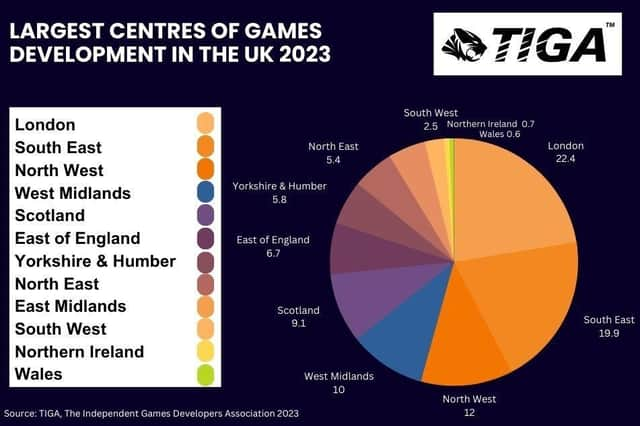Scotland key hub as UK video games studio numbers surge


New figures from trade association Tiga show that employment in the UK’s games development sector surged by 11.4 per cent, while studio numbers jumped by about 18 per cent during the period from December 2021 to April 2023. Wider games industry employment, tax revenues and investment also grew markedly, the report notes.
It also highlights that almost 80 per cent of the UK’s games development workforce is located outside of London. While the UK’s largest city employs about 22 per cent of the games development workforce across 587 companies, the rest of those workers are employed outside of the capital/ While about one-fifth of development staff are located in the south east of England, the third, fourth and fifth largest centres of games development by headcount are the north west of England, the West Midlands and Scotland, respectively. Including indirect staff, games development companies support in excess of 53,000 jobs outside of London, according to the latest study.
Advertisement
Hide AdAdvertisement
Hide AdTiga’s insight into the state of the UK video games industry is based on an extensive survey of games businesses, with analysis by Games Investor Consulting. The number of creative staff in studios surged by 15.2 per cent and at an annualised rate of 11.4 per cent from 20,975 in December 2021 to 24,155 full-time and full-time equivalent staff in April 2023. The total workforce including freelancers grew to 25,026.
Richard Wilson, Tiga chief executive, said: “The UK video games development sector is powering ahead. Employment is soaring and studios are continuing to hire at near record rates. With high growth games studios in many regions, the sector is supporting economic growth across the UK. Our sector’s outstanding long-term prospects are underpinned by strong consumer demand, rising foreign direct investment which is attracted by our highly skilled workforce and video games tax relief, which reduces the cost of games development.
“If the UK is to win an even larger share of the growing market for video games, then the UK government should enhance the generosity of our video games tax relief (soon to be transformed into a video games expenditure credit), introduce a video games investment fund to help more small studios to scale up and establish an industrial secondments programme to drive skills development.”
The report reveals that the number of jobs indirectly supported by studios in the supply chain rose from 38,348 to 44,162 over the period under review. Overall studio numbers grew from 1,528 to 1,801, an increase of 17.8 per cent. Combined direct and indirect tax revenues generated by the sector for the UK Treasury are estimated to have increased from £1.2 billion to £1.5bn.
Wilson added: “The video games industry has immense potential to contribute to the Levelling Up agenda, not least due to the 44,000 people working in the games supply chain which is mostly based outside of London.”
Comments
Want to join the conversation? Please or to comment on this article.